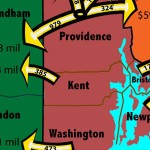Things We Read Today (41), Wednesday
A Economic World Sorted by Media Preference
Union thuggery and economic impact aren’t the only topics on which it’s possible to have divergent understandings of what’s going on the world depending what media sources one watches. If I had to pick a side (naturally) I’d say conservatives have a better feel for the multiple versions — first, because we have a harder time avoiding the mainstream narrative that fills the papers and most television news and, second, because we’ve got a cultural affinity for disputing the errors of that mainstream, which kinda requires reading it in the first place.
Be that as it may, the state of the economy is perhaps the most substantial topic on which different sources present the kaleidoscope with differing numbers of turns. Here’s the Investors Business Daily version, which (naturally) comports with my sense of things:
Start with payroll jobs. The 146,000 wasn’t awful, but to make a serious dent in joblessness, we need to add at least 200,000 a month for a prolonged period. In this poisoned atmosphere for business, that won’t happen.
Since 2011, businesses have added about 151,000 jobs a month. But since June that’s slowed to just 139,000. We’re clearly going the wrong way.
And by the way, remember those big payroll gains in September and October, right before the election? Forget it. The Labor Department has revised down its job estimates for those two months by 49,000.
OK, but we still have private-sector job growth, right? Not really. In the last six months, 621,000 of the 847,000 new jobs created have been in government, not the private sector, according to CNSNews.com. That’s 73% of all jobs — not a healthy labor market.
Exchanges (Pun Intended)
ObamaCare health benefit exchanges represent another area of differing narratives. For the Providence Journal, Felice Freyer concentrates on providing an update on Rhode Island’s progress in setting one up and describing some of the nifty things the exchange will do, in general terms. Here’s an interesting paragraph, though:
Rhode Island is among 16 states that have so far declared the intention to develop an exchange, a centerpiece of the federal health care overhaul. (According to the National Academy for State Health Policy, 6 states are expected to partner with the federal government; 22 have rejected a state-run exchange, defaulting to a federal-run exchange; and 6 are undecided.)
Jeffrey Anderson from the Weekly Standard has a somewhat different take:
States are not required to set up Obamacare exchanges, but it seems to have surprised observers that many are choosing not to. Politico reports that, with only 17 states so far having said they will set up the exchanges, the “Department of Health and Human Services’s role in bringing the law to life is going to be a lot bigger than originally thought.” More than a third of all states have already said they won’t set up the Obamacare exchanges.
Whereas Freyer says states will have “wide latitude in designing their exchanges,” Anderson highlight’s Utah’s version of an exchange, which in the words of Gov. Gary Herbert is “based on defined contribution, consumer choice, and free markets.” Anderson says that’s “rather plainly banned by Obamacare.”
Anderson’s bigger point, though, is the hope that some states’ rebellion against ObamaCare will focus attention on odd dealings behind the scenes in the federal government’s process:
Obamacare’s federal exchanges will be an extremely complicated technical endeavor to set up and run, as (among other things) they would involve compiling massive amounts of risk-selection data on individual Americans. In addition to raising extraordinary privacy concerns, the data involved would be like gold to insurers.
And wouldn’t you know that, in a series of actions that included hiring a former ObamaCare director friendly with Health and Human Services Secretary Kathleen Sebelius, UnitedHealth has arguably positioned itself “to police the same field in which it would be a competitor” by buying a company contracted to set up and operate the federally created exchanges.
How the Government Achieves Success
My uncle used to joke that he’d trained his dog to sit on command; you just had to wait until it looked like he was getting ready to put his rear-end down and then shout, “sit!” Libertarian mainstream-media infiltrator John Stossel has a good line in that vein:
Because companies just want to make a buck, it’s logical to assume that only government rules assure workers’ safety. The Occupational Safety and Health Administration sets safety standards for factories, and OSHA officials proudly point out that workplace deaths have dropped since it opened its doors.
Thank goodness for government, right? Well, not so fast. Go back a few years before OSHA, and we find that workplace deaths were dropping just as fast.
Workers are safer today because we are richer, and richer societies care more about safety. Even greedy employers take safety precautions if only because it’s expensive to replace workers who are hurt!
Government is like the person who gets in front of a parade and pretends to lead it.
It’s actually worse than that, in many cases — more like if the faux leader’s performance somehow puts obstacles in the marchers’ path.
Some years back, when I was first stunned by the lackadaisical attitude of my fellow construction workers toward a little substance known as asbestos, I wrote about the ways in which government regulation had created an incentive for contractors and their workers to cover up their handling of hazardous materials. That’s especially true in a perennially sluggish and fading economy, such as the one Rhode Island is test-running for the rest of the nation.
Union Power in RI
However much power labor unions have to influence the shape that journalists give to their reportage in Rhode Island, the Ocean State’s teachers’ unions are among the most powerful in the country. WPRI’s Ted Nesi reports on a Fordham Institute and Education Reform Now comparison of such unions’ influence in each state:
The two organizations — the National Education Association Rhode Island and the smaller Rhode Island Federation of Teachers and Health Professionals — are the fifth-strongest teachers unions in the United States based on a range of measures …
Nor do all state policies mirror traditional union positions. While charter schools are restricted, student achievement is “the preponderant criterion in teacher evaluations, and teachers are eligible for dismissal after multiple unsatisfactory ratings.” However, Rhode Island teachers are dismissed for poor performance “at a lower rate than in almost every other state,” nor does the state support for pay for performance.
By the way, could somebody with a differing opinion from the teachers’ unions in the state please send Ted Nesi your business card? He seems to have misplaced them all, inasmuch as he emailed National Education Association of Rhode Island Executive Director Bob Walsh for comment but apparently couldn’t get ahold of anybody who might have a different perspective on the study than touting “better working conditions for teachers.” (That’s Nesi’s paraphrase, not a direct quotation from Walsh.)




